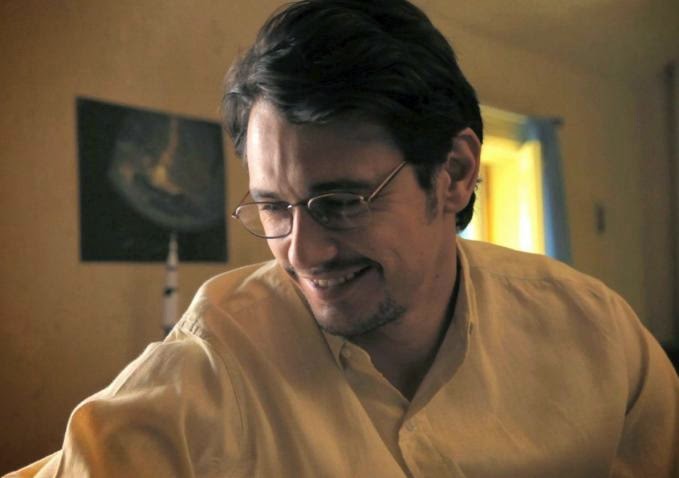DVD review - The Color of Time
James Franco stars as CK Williams, a Pulitzer Prize-winning poet whose works are the basis of this movie. This is notably Franco's third time playing a poet in a film after Howl and The Broken Tower.
The series of autobiographical poems reveal a lot of Williams' life going back decades. What's odd is that this movie has a dozen writers and 11 directors. All of those people put together this piece of cinema, and I'm not sure that it was necessary.
Seemingly, each person tackled adapting an individual poem by Williams into a segment that we see here. There is no demarcation within the movie, which indicates which segment a particular director did. There aren't even titles to suggest which specific poems were used. It's only apparent on the DVD menu. It's not quite the anthology film that one might assume. The segments and the directors of them don't stand out. All the segments run together as if by one person's vision, and in that case the need for so many filmmakers doesn't feel necessary or at all effective. If it had, this would have been the most interesting biopic that has thus far been made.
Like Boyhood, this movie shows snippets of Williams' life starting with him as a 5 or 6-year-old. It goes farther than Richard Linklater did and goes into Williams as a parent of a toddler. This movie is better in that it's shorter, but it's possibly too short. It's basically just a series of vignettes with not a lot of context or expansion. There's a lot of compelling imagery and depth to explore, but the movie only gives a taste before taking it all away.
Jessica Chastain plays Williams' mother. We see her only when Williams is a little boy and teenager when he's referred to as Charlie. It's bizarre because the initial scenes with Chastain and the little boy look ripped straight out of Terrence Malick's The Tree of Life. Malick of course came up with his own poetic narration. Here, Franco is simply reading from Williams' book of poetry.
Where this movie goes beyond Malick and Linklater is its more touching upon sex. One scene has Charlie as a young adult, played by Henry Hopper, go to a black prostitute and receive fellatio, while focusing on the rollers in the middle-age woman's hair. There's another scene where Charlie, played by James Franco, drives to a convenience store and sees a boy reading a gay magazine, rather openly in what might be the 1970's or 80's. Both scenes are curios, but they are then abandoned and never mentioned again.
This is indicative of a lot of the movie. Things are thrown out and then dropped. It's not a traditional narrative. It gives us more a sense of this man's life than any kind of definitive statement.
Two Stars out of Five.
Rated R for some sexuality, nudity, language and drug use.
Running Time: 1 hr. and 15 mins.
The series of autobiographical poems reveal a lot of Williams' life going back decades. What's odd is that this movie has a dozen writers and 11 directors. All of those people put together this piece of cinema, and I'm not sure that it was necessary.
Seemingly, each person tackled adapting an individual poem by Williams into a segment that we see here. There is no demarcation within the movie, which indicates which segment a particular director did. There aren't even titles to suggest which specific poems were used. It's only apparent on the DVD menu. It's not quite the anthology film that one might assume. The segments and the directors of them don't stand out. All the segments run together as if by one person's vision, and in that case the need for so many filmmakers doesn't feel necessary or at all effective. If it had, this would have been the most interesting biopic that has thus far been made.
Like Boyhood, this movie shows snippets of Williams' life starting with him as a 5 or 6-year-old. It goes farther than Richard Linklater did and goes into Williams as a parent of a toddler. This movie is better in that it's shorter, but it's possibly too short. It's basically just a series of vignettes with not a lot of context or expansion. There's a lot of compelling imagery and depth to explore, but the movie only gives a taste before taking it all away.
Jessica Chastain plays Williams' mother. We see her only when Williams is a little boy and teenager when he's referred to as Charlie. It's bizarre because the initial scenes with Chastain and the little boy look ripped straight out of Terrence Malick's The Tree of Life. Malick of course came up with his own poetic narration. Here, Franco is simply reading from Williams' book of poetry.
Where this movie goes beyond Malick and Linklater is its more touching upon sex. One scene has Charlie as a young adult, played by Henry Hopper, go to a black prostitute and receive fellatio, while focusing on the rollers in the middle-age woman's hair. There's another scene where Charlie, played by James Franco, drives to a convenience store and sees a boy reading a gay magazine, rather openly in what might be the 1970's or 80's. Both scenes are curios, but they are then abandoned and never mentioned again.
This is indicative of a lot of the movie. Things are thrown out and then dropped. It's not a traditional narrative. It gives us more a sense of this man's life than any kind of definitive statement.
Two Stars out of Five.
Rated R for some sexuality, nudity, language and drug use.
Running Time: 1 hr. and 15 mins.











Comments
Post a Comment